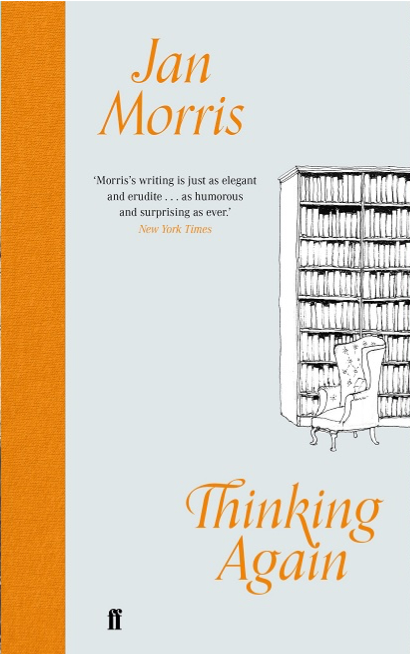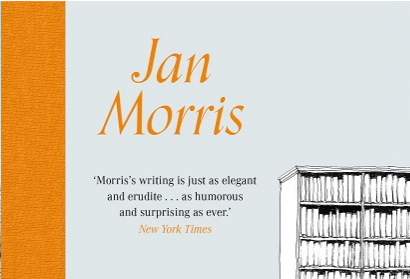Gemma Pearson reviews the latest book by one of Wales’s literary giants, the second of Jan Morris’s diaries, Thinking Again.

“Welshness is Saints and Footballers, Poets and Wizards and
Goats and Miners and Singers and Fairies and magical confusions
– all are always with us”
Jan Morris, a remarkable welsh writer and historian, has lived a colourful life. Before her gender reassignment surgery in 1972 – for Jan Morris was born James Morris – she had already served in the Second World War, accompanied Hillary and Norgay on the British Mount Everest Expedition, reported on the 1961 trial of Nazi war criminal Adolf Eichmann, and visited Hiroshima after the nuclear attack. When it comes to her published work, however, Morris is perhaps best known for the Pax Britannica trilogy (1968-1978) and her wistful travel narratives that conjure an infallible sense of wanderlust in even the staunchest of homebodies. Her classic and unparalleled evocation of Venice even won her the 1961 Heinemann Award. Now, living in a dreamy 18th-century barn hidden away “in a corner of Britain,” Morris’s world has shrunk to a more manageable size, and her writing has turned inwards. Following the bestselling In My Mind’s Eye published by Faber in 2019, Thinking Again confirms Morris’s gift for daily diary writing. Do not think that a lifestyle devoid of global travel undermines Morris’s scope for brilliance, however. Rather, in Thinking Again, readers are welcomed, with open arms (the book’s epigraph reads “With Kind Regards to Everyone”), into the mind of this remarkable writer as she casts her eye on modern life and “cyber-culture,” the act of writing, and what it means to be a Welsh national.
There are 126 diary entries in this collection, each one standing as a perfect miniature of Morris’s life in rural Wales. Like the winding country lanes that surround her beloved home, Stefan Morys, Morris’s entries effortlessly breeze between issues of the personal and local and wider, more global concerns. Frequently, and with intelligence and equanimity, Morris contemplates matters such as Brexit, Trump’s America, or the ongoing Middle Eastern conflicts. At the turn of a page, personal affairs such as the struggles she and Elizabeth – her partner of seventy years – face in light of Elizabeth’s dementia diagnosis take full focus. Regardless of the subject matter, Morris has a knack for provoking introspection.
At 93 years of age, however, Morris is under no illusions that this is likely to be her last book and, with light derision, refers to herself as “an ageing litterateur” who is “well past [her] sell-by date.” Accordingly, she writes about her impending passing with a combination of disarming sincerity and composed contemplation. On Day Four for example she mentions that a gravestone, already etched with an epitaph, sits under the stairs waiting to mark the couple’s shared plot and on Day Eighty-Eight she muses that “earth would be a better place if more of us left a bit earlier”. Nevertheless, Thinking Again is saturated with an invigorating liveliness that stems largely from Morris’s sunny outlook on old age; by“making fun of it, exploring its ironies and its moments of beauty” one can “soften the undeniable tragedy” of death. Recalling cheerful walks at the beach, afternoon teas enjoying Earl Grey tea and fresh jam, and amusing anecdotes about technophobic mishaps provides a light reprieve from the more pressing reflections that contextualise Morris’s daily reveries as a nonagenarian.
Part of Morris’s appeal as a diarist stems from the palpable joy that radiates from each and every entry. She claims that “even the dullest day is enlivened” by her daily writing, a feeling that is sure to be re-lived by her readers. The pages of Thinking Again are open portholes; they are little windows offering delightful snippets of insight into the insular workings of Morris’s mind. Did you know, for instance, that Jan Morris favours cats over dogs? That she goes out to walk one thousand paces everyday rain or shine? Or that she harbours an unexpected partiality for Tiger Woods and Two and a Half Men? Throughout the two hundred or so pages, we learn details that would be trivial in the life of an average person. But Jan Morris is not an average person; she is one of Britain’s greatest literary figures and these “inconsequential little pieces” of writing, therefore, feel exceptionally generous and important.
Morris is particularly unsparing when it comes to the enchanting descriptions of her home. In the pages of this diary, Trefan Morys is as animate as its living, breathing human inhabitants; it bursts with keepsakes, books, travel guides, and memories and has a curious air of the mystical and the oneiric. The imagery conjured when Morris writes of her home, “opposite the big elm, with the white cupola and the weathervane on its roof,” is idyllic and warm and – despite the almost constant rain – is steeped with a romantic nostalgia for pastoral living. Strikingly, this echoes Morris’s vision of Wales and Welsh identity – “the very nature of Wales as a whole is introspective, traditional, nostalgic and imaginative” – and, of course, the diary medium itself. Has Morris cracked the code to representing modern Wales in writing? Of course, writing about place is Jan Morris’s speciality, and her pin-sharp ability to put “Cymreictod, the intangible state of being that is Welshness,” into words suggest that she is certainly on the right tracks.
Despite almost exactly two years that have passed since it was penned, Thinking Again is uncannily contemporaneous. On Day Two Morris claims that the spring of 2018 has felt like “one long, disorienting cock-up, [that] has knocked many of our disciplines askew,” forcing her to question “is nobody decent anymore?” This is a question that many of us have been asking in the midst of the COVID-19 crisis hitting the UK this spring. And what is Morris’s answer to her own question? – Kindness. This extraordinary woman finds traces of kindness everywhere: “in every row of houses, almost anywhere, in any country, decent people are living, only waiting to laugh, cry and be kind.” She also practices it in her own life, continually demonstrating a fresh, altruistic sensibility that we could all learn from. Jan Morris’s overarching message is clear: we must all, always, be considering our lives, our histories, our output, and our innate human aptitude for kindness; we must always be thinking again.
Thinking Again by Jan Morris is available now from Faber.
Gemma Pearson is an avid contributor to Wales Arts Review, with a focus on literature content.



 Enjoyed this article? Support our writers directly by buying them a coffee and clicking this link.
Enjoyed this article? Support our writers directly by buying them a coffee and clicking this link.







